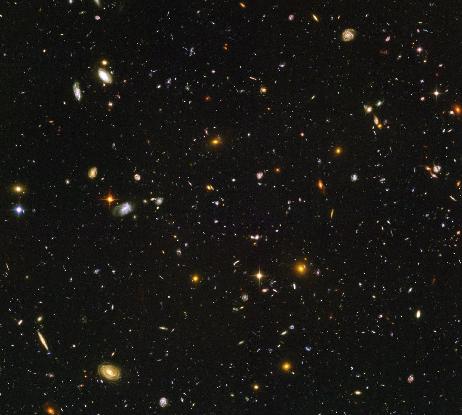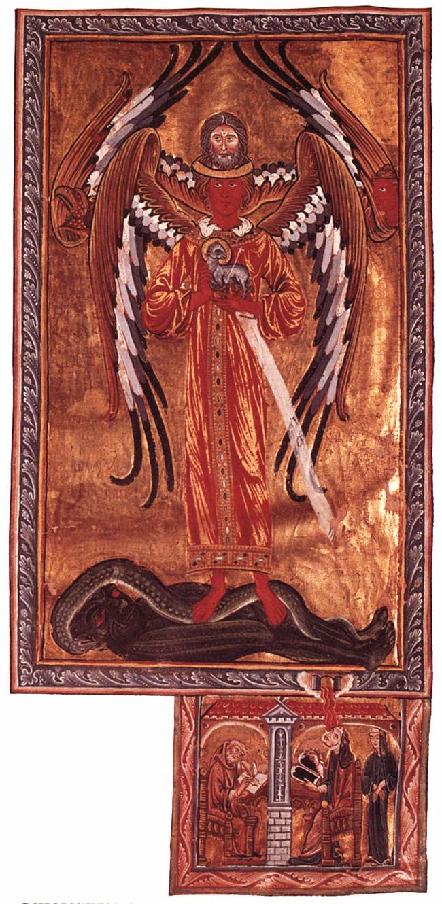Epiphany V "love overflows"
GREAT AND MUNDANE ARE YOUR WORKS
In this Sunday’s scripture portions, the majesty of Isaiah’s characterization of God contrasts with the understated ordinariness of Jesus’ healing of Peter’s mother-in-law. Even within the Isaiah passage, (40:21-31) the impossibility of comprehending God’s power is contrasted with God’s loving attention to the insignificant inhabitants of earth – from the vantage of the heavens, people appear like flecks of grasshoppers – hollow, weightless, camouflaged in the dry grasses. And time? A mere breath, a withering gust of wind. And yet, God imparts power to the faint, the weary, the weak who “wait for the Lord.” “They shall mount up with wings like eagles.”
The Psalm also pairs the mundane and majestic: “He heals the brokenhearted and binds up their wounds. He counts the number of the stars and calls them all by their names.” Psalm 147:3-4
On this page you’ll find a photo from the Hubble Deep Field to contemplate, as well as thoughts on the collect, and quotes on Divine Love appropriate to this Season of the Soul.
I Thy Greatness, My Nothingness
God in Heaven, let me really feel my nothingness,
not in order to despair over it, but in order to feel
the more powerfully the greatness of Thy goodness.
- Soren Kierkegaard (The Prayers of Kierkegaard)
|
 |
| Galaxies in the Hubble Deep Field, NASA |
|
|
III Stay on the Path: the Collect
It is worth taking a little time to pray through the Collects of Epiphany as a spiritual exercise (The [American] Book of Common Prayer pp. 214-217). You place yourself within a journey: visiting the crib with the Magi, observing the Theophany over Jesus at the Jordan river, in scenes unfolding the manifestation of Jesus throughout the Galilean ministry, until the turning point in the Gospels; the Theophany on the mountain, the Transfiguration. Jesus then sets his face toward Jerusalem (and we brace ourselves for Lent).
Since the publication of the 1979 prayer book I wondered in a superficial way, why this Sunday’s Collect appears in Epiphany? In other Epiphany prayers, images of light prevail: from “the shining of a star” to “beholding the light of his countenance … changed into his likeness from glory to glory.” “Light” “illumined” “shine” “radiance” “perceive” “peace” “love” “light of that love” “manifested” appear between them. Isn’t there plenty of time in Lent to pray, “set us free from the bondage of sin”?
What is sin, though, but the refusal of the gift of authentic love and of true light, and embracing the endless diversions glittering falsely just far enough off the path to draw us, stumbling, back into the dark? This Sunday’s collect reminds the church and the individual person on his or her journey through this season, of the promise of “the liberty of that abundant life” offered in the Paschal mystery. [My teacher, Massey Hamilton Shepherd created this prayer in the 20th century from allusions to these passages of scripture: Gal 4:3-5, Rom 8:15, Rom 8:19-21, John 10:10, Lk 4:16-21]
In our chapel this past Sunday, Sister Carol Bernice CHS concluded her sermon with the following image. “What a great gift to us--we really don’t have to be afraid we won’t be able to discern the path--it is wide open and well lit and we just naturally head for it especially when we’re in the dark. We are called into the Light, we grow into the Light, we eat the Light, we become the Light. Alleluia!”
|
|
Collect for the Fifth Sunday after the Epiphany
Set us free, O God, from the bondage of our sins, and give us the liberty of that abundant life which you have made known to us in your Son our Savior Jesus Christ; who lives and reigns with you, in the unity of the Holy Spirit, one God, now and for ever. Amen.
|
 |
| The healing of Peter's mother-in-law, Chora Museum, Turkey |
|
|
II Divine Self Giving
The self-giving of God to human consciousness is limited only by the capacity to receive this love. The following passage expresses beautifully the self-giving of God in love.
The activity of God must be limitless creativity. It must set no interior limit to its own self-giving. It must ever seek to enlarge the capacity to receive of the ‘other’ to which it gives. The infinity of the universe must be understood, with awe, as the expression or consequence of the limitlessness of the divine self-giving: for the divine aspiration to give must ever enlarge the bounds of that which is to receive. Nothing must be withheld from the self-giving which is creation: no unexpended reserves of divine potentiality: no ‘glory of God’ or ‘majesty of God’ which may be compared and contrasted with the glory of the galaxies and the majesty of the universe: no ‘power of God’ which might over-ride the God-given powers of the universe: no ‘eternity of God’ which might outlive an ‘eternal universe’…. From this self-giving nothing is held back: nothing remains in God unexpended. W.H. Vanstone, Love’s Endeavour, Love’s Expense
|
 |
| The Vision of Divine Love, Hildegard of Bingen, c1200 |
|
|
Love overflows into all things,
From out of the depths to above the highest stars;
And so Love overflows into all best beloved,
most loving things,
Because She has given to the highest King
The Kiss of Peace.
- Hildegard of Bingen - Trans. Barbara L. Grant
|
|